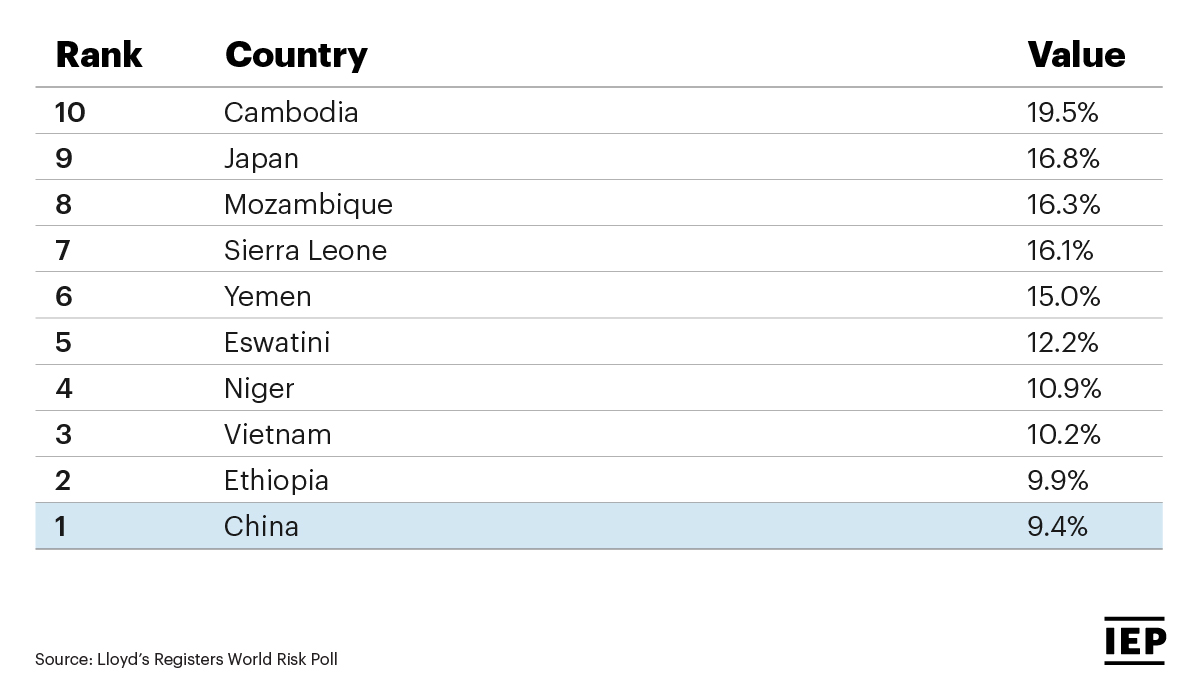Lloyd’s Register World Risk Poll Snapshot
The Lloyd’s Register Foundation World Risk Poll is an ongoing project in which 150,000 people in 142 counties are asked 75 questions relative to their experiences and perception of risk. The poll, first conducted in 2019, sets an important baseline from which changes of experiences and perception of risk in a post COVID world can be measured. Currently the Institute of Economics and Peace is analysing the first data set and each week we offer a snapshot of what we’ve learned so far.
China
The Lloyd’s Registers Foundation World Risk Poll suggests a Chinese population that’s fearless, trusting of their government, not particularly concerned about a changing climate and very ready to welcome the rise of artificial intelligence (AI).
They are also one of the most optimistic populations on earth when it comes to future peace and personal safety.
When Chinese people were asked what the greatest source of risk was to their personal safety only 1.5% said ‘violence’ and of the 142 nations polled, only two other nations (Uzbekistan and Turkmenistan) reported a lower number.
Generally, the poll shows a strong correlation between the actual experience of violence as reported by the respondents and worry about violence. While China does report a great degree of personal safety and security (only 4.9% saying they or someone they know personally has experienced serious harm from violence in the last two years), Chinese respondent’s lack of worry about violence was even lower than what would be expected by the rest of the data set.
The poll also asked respondents whether they thought they were likely to be the victim of violence in the next two years, and Chinese people were slightly less sanguine at 5.3%, but that still put them as one of the most hopeful nations polled.
Only 5.5% of Chinese respondents said they felt less safe than they had five years ago. By comparison, 79.1% of respondents from Hong Kong said they feel less safe than they did five years ago.
China was the engine that drove a strong regional trend also, with 50 percent countries in the Asia-Pacific region saying they feel safer now than they did five years ago. This made Asia-Pacific the region with the largest percentage of people who said they feel safer than they did five years ago.
The Chinese data about artificial intelligence (AI), a field in which China is a significant investor, was also of interest.
On the 142 countries polled, China had the lowest levels of concern about AI, with only 9.4% of respondents saying they thought AI would ‘mostly harm’ their country in the next 20 years.
Every other nations that had a significant investment in AI showed greater concern including France at 51.8%, the United States of America at 47.7% and the United Kingdom at 35.9%.
While China was most comfortable with AI’s future, a number of other Asian Pacific countries with a significant investment in AI also showed optimism. Japan, Singapore, South Korea and Taiwan all had fewer that 25% respondents saying they thought AI would do more harm than good in their country in the next two decades.
Chinese respondents were also less concerned with the effects of climate change than most other counties, with only 23.3% of Chinese respondents saying they thought climate change would be a very serious threat in their country in the next 20 years.
Only six counties were less concerned: Uzbekistan, Saudi Arabia, Myanmar, Egypt, Ethiopia and Yemen.
The generally optimistic trend continued when Chinese respondents were asked whether they more closely associated the word ‘risk’ with ‘opportunity’ or ‘danger.’ Only 43.6% responded ‘danger,’ a result that was again in stark contrast to those polled in Hong Kong (73.9%).
